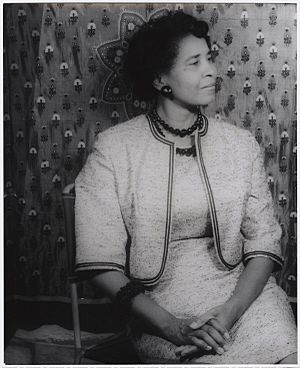Evelyn La Rue Pittman facts for kids
Quick facts for kids
Evenlyn La Rue Pittman
|
|
|---|---|

Photograph of Evelyn La Rue Pittman taken by Carl Van Vechten
|
|
| Born | January 6, 1910 |
| Died | December 1992 (aged 82) |
| Occupation | Author, composer, choral director |
Evelyn La Rue Pittman (born January 6, 1910, died December 2, 1992) was an amazing American author, composer, and choir director. She was known for her musical dramas and for arranging spiritual songs. Pittman used her talents to teach and inspire others, especially through her powerful musical "Freedom Child."
Contents
About Evelyn La Rue Pittman
Evelyn La Rue Pittman was born in 1910 in McAlester, Oklahoma. She loved music from a very young age. She even started writing her own songs when she was in first grade! Her interest in music continued through high school. She took part in school musicals and sang in the school choir. She was the first Black student to join this well-known choir.
Her Education and Music Studies
Pittman went to public school in Oklahoma City. She later studied at Spelman College and Oklahoma University. She earned her master's degree from Oklahoma University. While in school, Pittman learned to play the violin and trombone. She also studied harmony, which is about how musical notes fit together.
She received a special certificate from Langston University. This allowed her to teach music and social studies in Oklahoma. In New York, Pittman earned another certificate from Columbia University. This let her teach music at any level in the New York Education Department. She ended up teaching in the Greenburgh School District.
Pittman then studied composition at the famous Juilliard School of Music. She was likely the first Black Oklahoman to study there. She worked with Zelia Breaux on short operas called operettas. They also created other community programs. Pittman even studied with the very famous composer Nadia Boulanger in Paris and Fontainebleau, France. Her teachers, Harrison Kerr and Robert Ward, suggested she study with Boulanger.
Her Musical Works
Evelyn Pittman wrote a book for children called "Rich Heritage." It was first published in 1944 and updated in 1968. This book is full of short stories about famous Americans and includes songs. Pittman was also well-known for her choral arrangements of spiritual songs. These are special versions of traditional Black American songs for choirs. Her main works were musical dramas, which are like plays with music. Her folk opera, "Cousin Esther," was performed in Paris in 1957.
Pittman also arranged many spirituals and choral pieces. These works clearly show the influence of Black church music. Some of her published songs include “Any How,” “Rock-a-mah Soul,” “Sit Down Servant,” "Joshua,” “Nobody Knows the Trouble I See,” and “Tramping.”
"Freedom Child"
In 1968, Martin Luther King Jr. was sadly assassinated. This event deeply affected Pittman and inspired her to write. Two years later, Pittman, who was a music teacher at Woodlands High School, created "Freedom Child." This was a musical drama about Martin Luther King Jr. Her students at Woodlands performed it.
After getting great reviews in New York, Pittman and her students took "Freedom Child" on tour. They traveled all over New York state. Eventually, they took the musical to 11 different countries! Pittman also made a videotape of "Freedom Child" for school children and her friends in Oklahoma. She said, "It's something I've always wanted to do. Now children and other Oklahomans who didn't have the opportunity to see Martin Luther King will be able to learn about him." She explained that she wrote the musical because she truly cared about King. She even flew to Washington, D.C., to join the 250,000 people who gathered for his famous march. She felt she had to go to be able to face her students.
Pittman wrote the story, music, and lyrics for "Freedom Child." It took her two years to create the first version. She was a perfectionist and kept working on the musical drama. She once said, "If I don't stop writing soon, it will never be finished." Since its first performance in 1971, Pittman removed three songs and added three new ones. She said the songs included all types of music. This was because King's mother, Alberta, said her son liked all kinds of music. Pittman shared that King's mother invited her and her students to perform the musical in Atlanta. They performed at the Ebenezer Baptist Church. King's father, the Rev. Martin Luther King Sr., was at first nervous to watch the musical. But he later said it was the most real and true work he had seen about his son.

